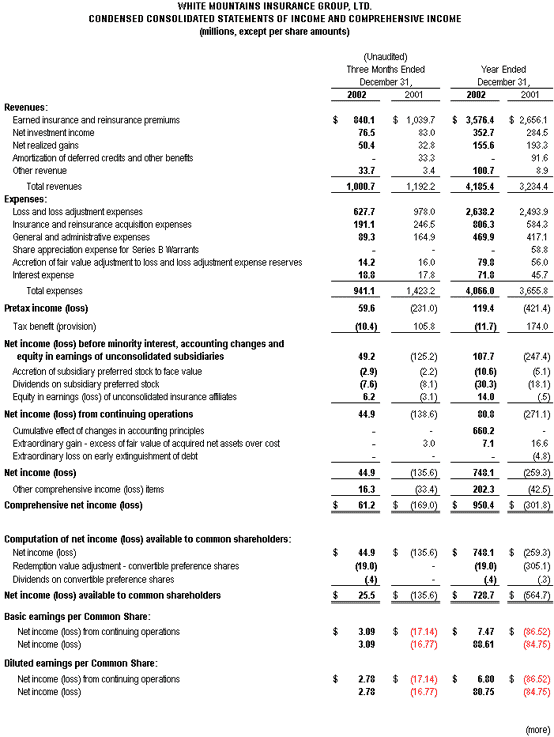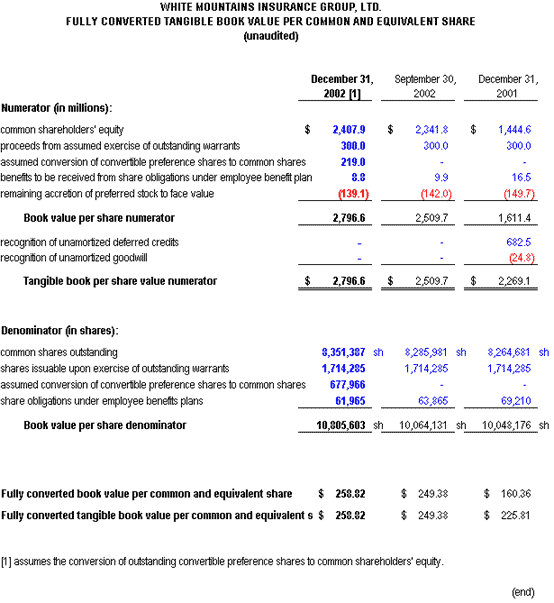White Mountains Reports Improved 2002 Results
HAMILTON, Bermuda, Feb 18, 2003 /PRNewswire-FirstCall via COMTEX/ -- White Mountains Insurance Group, Ltd. (NYSE: WTM) ended 2002 with a fully converted tangible book value per share of $259, a 15% increase for the year. The Company's comprehensive net income for 2002 was $290 million (excluding $660 million of deferred credits brought into income by an accounting change) compared to a loss of $302 million in 2001.
CEO Ray Barrette said, "We are pleased with our results in all areas of the Company. Our book value grew nicely thanks to solid investment performance and major underwriting improvements at both OneBeacon and Folksamerica. We finished the year with a strong balance sheet. Our reserves are in good shape, we are comfortable with the level and structure of our debt, and our investment portfolio is rock solid. We expect strong performances in all our businesses in 2003."
A summary of White Mountains' after-tax comprehensive net income follows:
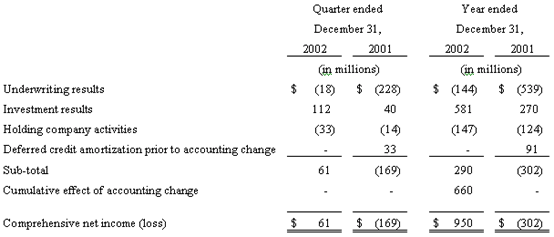
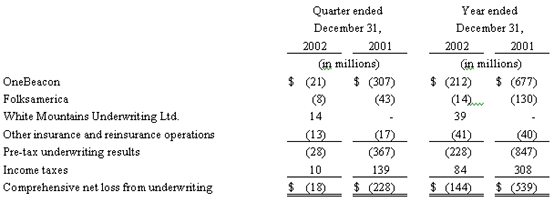
OneBeacon
OneBeacon's trade ratio on core operations, which is comprised of personal and commercial lines business in the Northeast and specialty businesses, was 98% for 2002 compared to 116% for 2001. Net written premiums on core operations were $1.8 billion in 2002 and in 2001, as price increases were offset by reductions in volume necessary to re-underwrite the book and reduce exposure to catastrophe claims.
The trade ratio on OneBeacon's total business, including non-core/run-off business, was 109% for 2002 compared to 120% for 2001. Net written premiums on OneBeacon's total business were down to $2.5 billion in 2002 from $3.5 billion in 2001 as premiums from non-core operations continue to run-off as desired.
During the 2002 fourth quarter, OneBeacon completed a detailed study on its non-A&E reserves based on recent trends in loss development and reconstructed supplemental historical claims information. As a result, OneBeacon strengthened reserves by $57 million pre-tax. Reserves for accident years 2000 and prior were increased by $97 million, while reserves for accident year 2001 were reduced by $40 million due in large part to favorable development on losses from the September 11th disaster. Reserves for A&E exposures are covered by a $2.5 billion reinsurance cover purchased by OneBeacon on June 1, 2001 from National Indemnity (NICO), a Berkshire Hathaway company, rated A++ by A.M. Best. During the 2002 fourth quarter, OneBeacon also recognized an after-tax gain of $23 million as a result of the curtailment of its pension plan and retiree health benefits.
John Cavoores, President of OneBeacon, said, "Our 2002 core trade ratio of 98% reflects the effects of the operating improvements we have made, as well as favorable weather conditions and a hardening market. We achieved price increases of roughly 20% in both commercial and personal lines during 2002. Our 2002 commercial lines trade ratio of 103% is significantly better than our 2001 trade ratio (ex-September 11) of 114%; however, it fell short of our target due to the effects of large losses and a significant decrease in our premium base. Personal lines, which includes AutoOne, our New York personal automobile LAD division, had a nice year with a 98% trade ratio, which represents a big improvement over our 2001 trade ratio of 110%. Specialty lines had another outstanding year with a 90% trade ratio and significant premium growth."
Net written premiums for commercial, personal and specialty lines were approximately $450 million, $1.1 billion and $280 million in 2002 versus $680 million, $860 million and $220 million in 2001.
Folksamerica
Folksamerica's statutory combined ratio, adjusted for the effects of retroactive reinsurance, was 99% for 2002 compared to 120% for 2001. Net written premiums increased 48% from $459 million in 2001 to $679 million in 2002.
Steve Fass, CEO of Folksamerica, said, "2002 was the year all our hard work and commitment to maintaining both balance sheet and underwriting discipline through the prolonged soft market paid off. In 2002, rates were up by an average of 30%, commissions were reduced and terms and conditions improved. Based on a very good January renewal season, we believe the hard market will continue into 2003. You can count on us to be active participants."
White Mountains Underwriting Ltd. ("WMU")
WMU, White Mountains' underwriting manager specializing in the placement of international property excess reinsurance, had a successful first year of operations, generating underwriting fees of $44 million and comprehensive net income of $33 million. Most of this income was generated through WMU's consulting contract with Olympus Re, its main third party customer.
Other Insurance and Reinsurance Operations
White Mountains' other insurance and reinsurance operations consist of Esurance, Fund American Re and the International American Group. Underwriting losses for the 2002 and 2001 periods primarily consist of Esurance's after-tax operating losses during its start up and development stage. Losses in 2002 also include European flood losses at Fund American Re of $4 million.
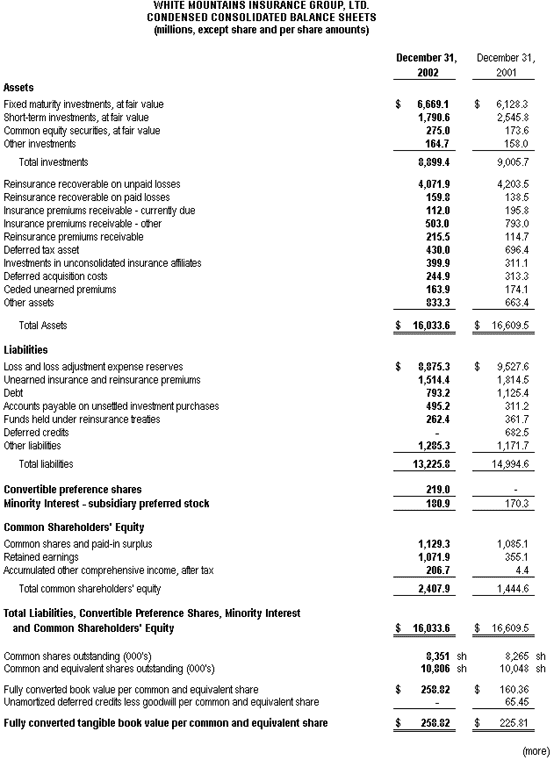
Montpelier had a successful first full year of operations in the international reinsurance marketplace. White Mountains' interest consists of warrants and common equity that give the Company a 21% economic interest in Montpelier on a fully converted basis.
Realized and unrealized gains (losses) include losses on White Mountains' interest rate swap contracts of $31 million and $3 million in the years ended December 31, 2002 and 2001. These contracts were entered into to achieve a fixed rate on the credit facility established in conjunction with the acquisition of OneBeacon in 2001.
John Gillespie, Managing Director of Investments and Capital of OneBeacon, said, "Although the investment yields we have generated in 2002 were not spectacular, we were able to avoid most of the credit and equity valuation problems that plagued other insurance companies. We did so by sticking to our top priority -- capital preservation. In 2003, I expect that we will gradually accumulate equities when our individual security analysis identifies attractive valuations and gradually shorten the bond portfolio duration in response to historically low interest rates. We will do so cautiously, however, as capital preservation is still our number one priority."
Focusing on capital management, Gillespie added, "In October, our old friends at Franklin Mutual Shares became the largest shareholder of the Company by investing an additional $200 million. We also welcomed new partners -- Highfields -- who invested $25 million. We used the proceeds from the new equity capital to repay the seller note associated with the acquisition of OneBeacon. As a result, our debt-to-capital ratio is now down to 22%, closer to our sub-20% goal. During the next year, we will look to reduce our financial leverage below 20% and will also continue to evaluate opportunities in the financial markets to manage our overall capital position. However, we will be both patient and opportunistic as we are now very comfortable with our existing capital structure."
HOLDING COMPANY ACTIVITIES
White Mountains recorded after-tax losses of $33 million and $147 million for the quarter and year ended December 31, 2002 from holding company activities, mostly financing and purchase accounting charges. This compares with after-tax charges of $14 million and $124 million for the quarter and year ended December 31, 2001. Interest and other financing charges related to the acquisition of OneBeacon were $90 million in 2002 compared to $116 million in 2001. Purchase accounting charges also related to the OneBeacon acquisition were $32 million in 2002 versus $21 million in 2001.
White Mountains' comprehensive net income for the quarter and year ended December 31, 2001 also include $33 million and $91 million in deferred credit amortization taken prior to the adoption of new accounting standards. Upon adoption on January 1, 2002, these standards resulted in a one-time credit of $660 million in the first quarter of 2002 to recognize the full deferred credit balance in existence at that time.
ADDITIONAL INFORMATION
White Mountains is a Bermuda-domiciled financial services holding company traded on the New York Stock Exchange under the symbol WTM. Additional financial information and other items of interest are available at the Company's website located at www.whitemountains.com. The Company expects to file its Form 10-K with the Securities and Exchange Commission on or before Monday, March 31, 2003 and urges shareholders to refer to that document for more complete information concerning White Mountains' financial results.
Safe Harbor Statement under the Private Securities Litigation Reform Act of 1995
The information contained in this earnings release may contain "forward- looking statements" within the meaning of Section 27A of the Securities Act of 1933 and Section 21E of the Securities Exchange Act of 1934. All statements, other than statements of historical facts, included or referenced in this release which address activities, events or developments which we expect or anticipate will or may occur in the future are forward-looking statements. The words "believe," "intend," "expect," "anticipate," "project," "estimate," "predict" and similar expressions are also intended to identify forward- looking statements. These forward-looking statements include, among others, statements with respect to White Mountains':
- growth in book value per share or return on equity;
- business strategy;
- financial and operating targets or plans;
- incurred losses and the adequacy of its loss and loss adjustment expense reserves;
- projections of revenues, income (or loss), earnings (or loss) per share, dividends, market share or other financial forecasts;
- expansion and growth of our business and operations; and
- future capital expenditures.
These statements are based on certain assumptions and analyses made by White Mountains in light of its experience and perception of historical trends, current conditions and expected future developments, as well as other factors believed to be appropriate in the circumstances. However, whether actual results and developments will conform with our expectations and predictions is subject to a number of risks and uncertainties that could cause actual results to differ materially from expectations, including:
- the continued availability of capital and financing;
- general economic, market or business conditions;
- business opportunities (or lack thereof) that may be presented to it and pursued;
- competitive forces, including the conduct of other property and casualty insurers and reinsurers
- changes in domestic or foreign laws or regulations applicable to White Mountains, its competitors or its clients;
- an economic downturn or other economic conditions adversely affecting its financial position;
- loss reserves established subsequently proving to have been inadequate; and
- other factors, most of which are beyond White Mountains' control.
Consequently, all of the forward-looking statements made in this earnings release are qualified by these cautionary statements, and there can be no assurance that the actual results or developments anticipated by White Mountains will be realized or, even if substantially realized, that they will have the expected consequences to, or effects on, White Mountains or its business or operations. White Mountains assumes no obligation to update publicly any such forward-looking statements, whether as a result of new information, future events or otherwise.

